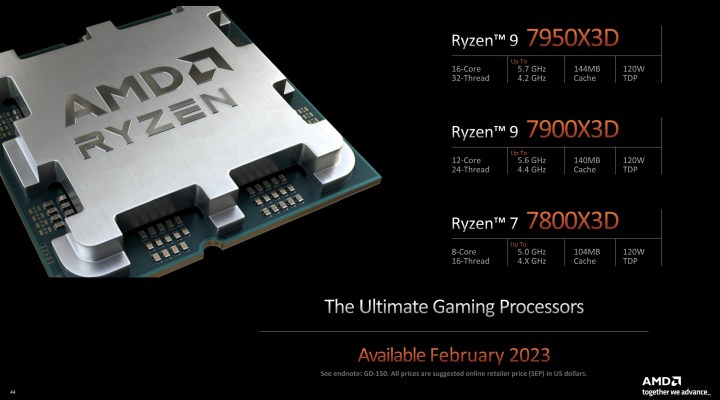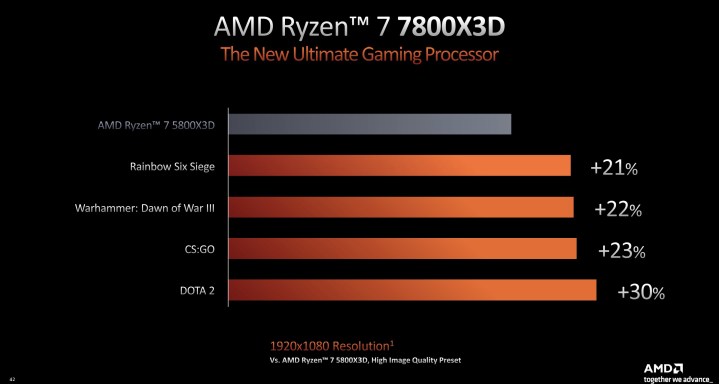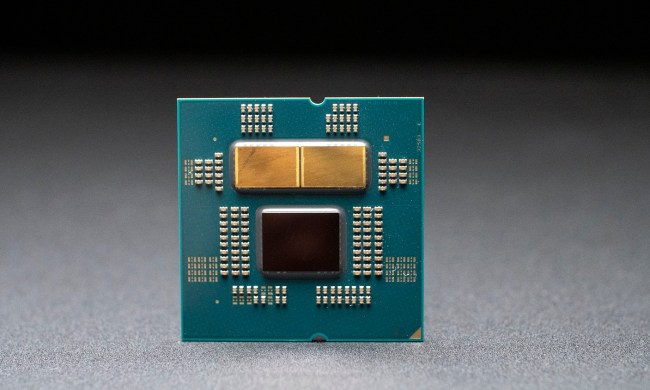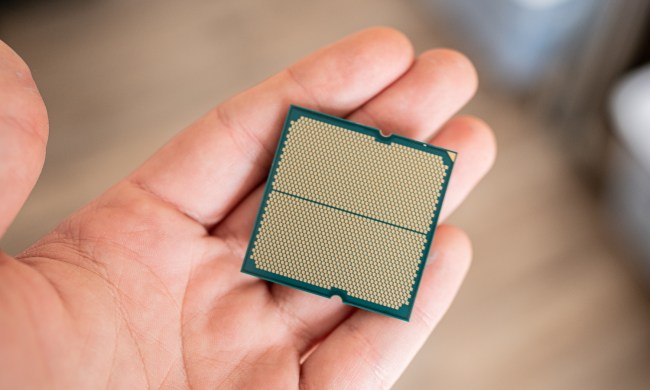AMD is starting off its CES strong with the introduction of new 3D V-Cache Ryzen 7000 CPUs. Unlike the previous generation, AMD isn’t restricting its 3D V-Cache to just a midrange CPU, and is instead introducing three chips that match most of AMD’s current-gen lineup.
AMD introduced the Ryzen 9 7950X3D, Ryzen 9 7900X3D, and Ryzen 7 7800X3D during its CES keynote today. The flagship chip, the Ryzen 9 7950X3D, tops out with 16 cores, a 5.7GHz boost clock speed, and 144MB of cache.
| Ryzen 9 7950X3D | Ryzen 9 7900X3D | Ryzen 7 7800X3D | |
| Cores/Threads | 16/32 | 12/24 | 8/16 |
| Base/Boost clock | 4.2GHz/5.7GHz | 4.4GHz/5.6GHz | 4.XGHz/5GHz |
| Cache size | 144MB | 140MB | 104MB |
| Power draw | 120W | 120W | 120W |
AMD’s 3D V-Cache is a packaging technology that allows AMD to stack cache on top of the processor. It may seem like a small change, but additional cache can have a big impact in gaming performance. That’s what we saw with the Ryzen 7 5800X3D in the previous generation, which can still go toe-to-toe with current-gen flagships.
AMD’s new chips are aimed at pushing beyond just gaming, which is where the Ryzen 9 7950X3D fits in. Against Intel’s Core i9-13900K, AMD says the Ryzen 9 7950X3D is up to 24% faster in games, as well as anywhere from 4% to 52% faster in productivity apps. That’s a shock considering the middling productivity performance of the Ryzen 7 5800X3D. That processor is one of the best gaming CPUs on the market, but it takes a beating outside of gameplay.

Even more surprising is that AMD’s 3D V-Cache chips consume less power than their Ryzen 7000 counterparts. All three processors have a rated power of 120 watts. By comparison, the Ryzen 9 7950X and Ryzen 9 7900X draw 170W, while the Ryzen 7 7700X draws 105W. This is an important spec to pay attention to as the release date nears. Although AMD only rates its flagships for 170W, they can climb above 200W in some cases. The 3D V-Cache parts may do the same.

Although AMD is expanding its 3D V-Cache offerings to bring more productivity power, gaming is still the main focus. The Ryzen 7 7800X3D is the main CPU for gamers based on AMD’s messaging, and it delivers up to a 30% boost in gaming performance compared to last-gen’s Ryzen 7 5800X3D. AMD says that gamers can expect around a 15% boost on average.
Even since the release of the Ryzen 7 5800X3D, gamers have been on the hunt for 3D V-Cache Ryzen 7000 CPUs — so much so that regular Ryzen 7000 chips have reportedly seen poor sales as a result. Thankfully, gamers won’t have to wait much longer. AMD didn’t provide a firm release date, but it said that Ryzen 70003D processors will arrive in February 2023.
AMD had even more announcements, so make sure to read our roundup of everything AMD announced at CES 2023.




